“The Sky over Berlin”, “Goodbye Lenin!”, “Knockin’ on Heaven’s Door” and other legendary works.
13. Tin drum
Die Blechtrommel
- Germany, France, Yugoslavia, Poland, 1979.
- Drama, military.
- Duration: 142 minutes.
- IMDb: 7.5.
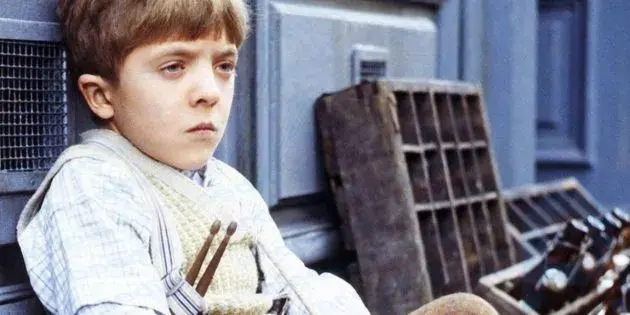
Oskar was born in Danzig in the mid-1920s. Moreover, his mother did not know exactly which of her two boyfriends was the father. The boy, at the age of three, became disillusioned with the adult world, deliberately fell down the stairs and decided never to grow up. In the body of a child, he goes through all the difficulties of wartime.
The film adaptation of the novel of the same name by Günter Grass, directed by Volker Schlöndorff, initially caused a lot of scandals. The authors were even accused of distributing child pornography. But years later, the public appreciated the philosophical drama. Now The Tin Drum is considered one of the main films of the German New Wave.
12. I'm Christina
Christiane F. — Wir Kinder vom Bahnhof Zoo
- Germany, 1981.
- Drama, biography.
- Duration: 138 minutes.
- IMDb: 7.6.
Young Christina, who loves the music of David Bowie, falls in love with a guy who is much older than her. To be closer to her lover, the girl starts taking drugs and gradually falls to the very bottom. She spends all her time looking for money for the next dose, engaging in prostitution and stealing things. The family is trying to save Christina, but it is very difficult.
This film is based on the autobiographical book of the writer Christiane F. Both the novel and the film caused an unprecedented resonance in society. The thing is that in West Germany in the late 1970s there was a real epidemic of drug addiction among teenagers. The general public did not know about this. It was the gritty, realistic film that opened up a frightening world to many.
An additional reason for the project's popularity was the soundtrack written by David Bowie. He even starred in the film, appearing in a concert number.
11. Good bye, Lenin!
Good Bye Lenin!
- Germany, 2003.
- Drama, melodrama, comedy.
- Duration: 121 minutes.
- IMDb: 7.7.
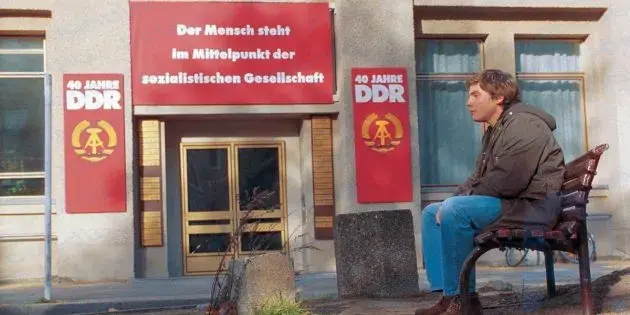
Christiane lives in East Berlin and is raising her son Alex alone. Due to stress, a middle-aged woman falls into a coma on the eve of the fall of the Berlin Wall. Eight months later, the heroine comes to her senses, but she is not allowed to worry. Therefore, Alex decides not to tell his mother about the unification of Germany and carefully creates for her the illusion of a socialist life.
In a tragicomic form, the film's authors talk about the collapse of ideals and adaptation to a new life. Moreover, they very carefully recreated East German goods of the late 1980s, which may seem familiar to many older Russian viewers.
10. White tape
Das Weiße Band - Eine deutsche Kindergeschichte
- Germany, France, Italy, Austria, 2009.
- Drama, thriller.
- Duration: 144 minutes.
- IMDb: 7.8.
In 1913, terrible crimes occur in a quiet village in northern Germany. Suspicion falls on the children of the local pastor, although they themselves wear white armbands as a symbol of purity. The village teacher is trying to figure out this matter, but it turns out that every village resident has his own secrets that no one wants to reveal.
The film was directed by Michael Haneke, one of the brightest representatives of modern auteur cinema. As in his previous work, “Hidden,” the creator reflects on the very nature of violence and the secret corners of the soul of every person. Moreover, Haneke connects actions not only with the individual, but also with the whole society. It is not for nothing that history ends with the outbreak of the First World War.
“The White Ribbon” was very loved by film critics. The film won the Palme d'Or at the Cannes Film Festival and received two Oscar nominations.
9. Nosferatu. Symphony of Terror
Nosferatu, eine Symphonie des Grauens
- Germany, 1922.
- Horror.
- Duration: 94 minutes.
- IMDb: 7.9.
Real estate agent Thomas Hutter arrives in distant Transylvania to meet with Count Orlok. It turns out that he doesn’t look human at all and looks like a terrible monster. Hutter tries to escape from Orlok, but he decided to take possession of his wife Helen.
It was from this film directed by Friedrich Wilhelm Murnau that films about vampires began to gain popularity . And even the classic image of the sinister count originated in Nosferatu. Moreover, the director was unable to buy the rights to the film adaptation of Bram Stoker’s Dracula, so the names of the main characters and the plot were slightly changed. Which, however, did not save the writer’s widow from claims.
The film, dark for its time, even gave rise to a rumor that Murnau invited a real vampire to play the main role, and actor Max Schreck tried to eat his colleagues and the film crew. Much later, this myth would be played out in the film “Shadow of the Vampire” with John Malkovich and Willem Dafoe.
8. Stroszek
Stroszek
- Germany, 1977.
- Drama, comedy.
- Duration: 115 minutes.
- IMDb: 7.9.
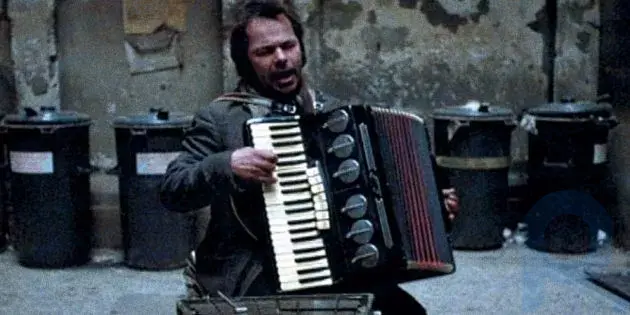
Bruno Stroszek, suffering from a mental disorder, is released from prison. He works part-time as a street musician, but dreams of a better life. For this purpose, the hero, together with his elderly friend and prostitute Eva, goes to the USA. But even there life turns out to be very difficult.
Director Werner Herzog in his films often talks about the lives of people rejected by society. Moreover, he wrote the script for this film in a few days specifically for the non-professional actor Bruno S., who really had been undergoing treatment for mental disorders for a long time.
The film “Stroszek” is called one of the director’s most poignant works. After all, he very vividly and realistically showed a society that destroys the personality of a little person.
7. Knocking on heaven's door
Knockin' on Heaven's Door
- Germany, 1997.
- Comedy, crime.
- Duration: 87 minutes.
- IMDb: 8.0.
Terminally ill Martin and Rudi met in a hospital room. Having learned that they only have a few days left, the heroes go to the sea, which they have never seen. What they don't know is that the car they stole belongs to the mafia.
The only film directed by Thomas Jahn that has earned worldwide success is shot in the spirit of the films of Quentin Tarantino . Except that it's more lyrical. No wonder the film quickly became a cult favorite and was widely circulated.
6. Sky over Berlin
Der Himmel über Berlin
- Germany, France, 1987.
- Fantasy, drama, melodrama.
- Duration: 130 minutes.
- IMDb: 8.0.
The inhabitants of Berlin are watched over by angels invisible to people. One of them falls in love with a circus acrobat and is ready to fall to the ground for her.
An elegant and at the same time philosophical film by Wim Wenders is visually constructed in a very unusual way. Much of the story was shot on black and white film . But from a certain point the world becomes colorful. This makes you feel the difference in the perception of different heroes.
5. Doctor Caligari's office
Das Cabinet des Dr. Caligari
- Germany, 1920.
- Horror, thriller.
- Duration: 71 minutes.
- IMDb: 8.1.
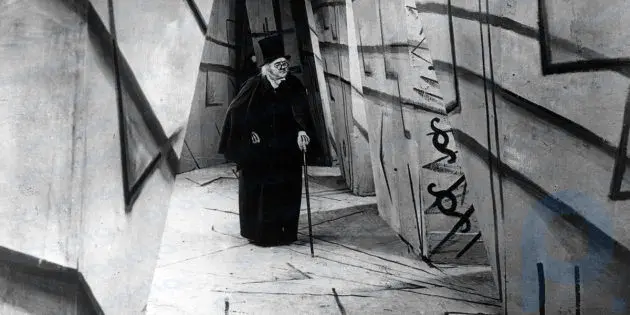
A young man named Franz tells his story to a new interlocutor. Once upon a time he encountered the sinister Doctor Caligari. He claimed that he had revealed the secret of somnambulism: his ward Cesare had been sleeping for 23 years and came to his senses only on the orders of his master.
Robert Wiene's classic film brings together ideas from Hoffmann's books, the film "The Golem" and the personal memoirs of screenwriter Karl Mayer. Moreover, the authors deliberately made the scenery as unrealistic and distorted as possible, and forced the actors to overact grotesquely. This is how they wanted to convey the perception of the world by crazy heroes.
It was with The Cabinet of Dr. Caligari that the German film expressionism movement began, from which many horror films later grew .
4. Submarine
Das Boot
- Germany, 1981.
- Drama, thriller.
- Duration: 150 minutes.
- IMDb: 8.3.
In the fall of 1941, the crew of a German submarine goes on a mission. The crew members are not yet thinking about the war and on the eve of departure they are having a lot of fun. A war correspondent also goes sailing with the crew. But soon the boat reaches the place of hostilities.
Wolfgang Petersen's painting is still considered one of the most realistic works about submariners. The director even forbade the actors to shave during filming and kept them on a strict diet so that they would look exhausted and tired, like a real crew during a long swim.
The film also has an extended six-episode version, which lasts more than 5 hours. And in 2016, a series of the same name was launched, which continues the story of “Submarine”.
3. Metropolis
Metropolis
- Germany, 1927.
- Fantasy, drama.
- Duration: 145 minutes.
- IMDb: 8.3.
In the futuristic city of Metropolis, residents are clearly divided into classes. At the lower levels the proletariat works in hellish conditions, at the top the rich enjoy life. But one day the son of the ruler of Metropolis, Freder, falls in love with a poor girl and decides to fight injustice.
Director Fritz Lang created the greatest example of film expressionism, touching on themes that are not outdated to this day. Moreover, visually the film looks interesting even after a century. And references and individual images from Metropolis can be seen in dozens of works: from Blade Runner to Star Wars .
2. M killer
M — Eine Stadt sucht einen Mörder
- Germany, 1931.
- Thriller, detective.
- Duration: 108 minutes.
- IMDb: 8.3.
The whole city is worried about the appearance of a sinister maniac who kidnaps and brutally kills children. The police are unable to make sense of the evidence, and residents are becoming paranoid. Then the criminal community itself decides to catch the villain.
Another work by Fritz Lang that has become legendary. The plot is based on the real crimes of a maniac nicknamed the Düsseldorf Vampire. It is also important that the film appeared at the dawn of sound cinema, and the director used an unusual technique: he connected the appearance of the villain with a specific musical theme - “In the Cave of the Mountain King” by Edvard Grieg.
“M Killer” is a picture that gave rise to many works in the noir genre - detective stories and crime thrillers, which were so popular in many countries decades later.
1. The lives of others
Das Leben der Anderen
- Germany, France, 2006.
- Drama, thriller, detective.
- Duration: 137 minutes.
- IMDb: 8.4.
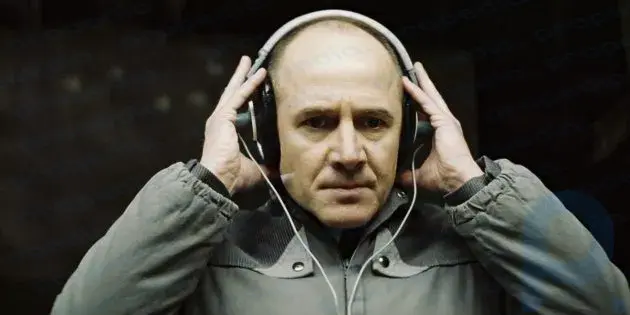
In 1984, Stasi secret service officer Gerd Wiesler receives a task: he must bug the apartment of the writer Georg Dreimann, who had an affair with an actress. Gradually, the spy begins to sympathize with those he is ordered to monitor. And when the danger of arrest looms over Draiman, Wisler decides to help.
The debut feature film by director Florian Henckel von Donnersmarck turned out to be incredibly popular both at home and in other countries. He received 11 nominations for the main German film award, the Deutscher Filmpreis, which was a record. “The Lives of Others” also won an Oscar for “Best Foreign Language Film” and many other awards.
Everyone notes the amazing combination of elaboration of historical details with the idea of human rebirth and revealing the issue of personal choice in a totalitarian society.
What German films do you like? Do you prefer classic film expressionism or realistic dramas? Or maybe your favorite painting was not included in this list? Then tell us about it in the comments.
